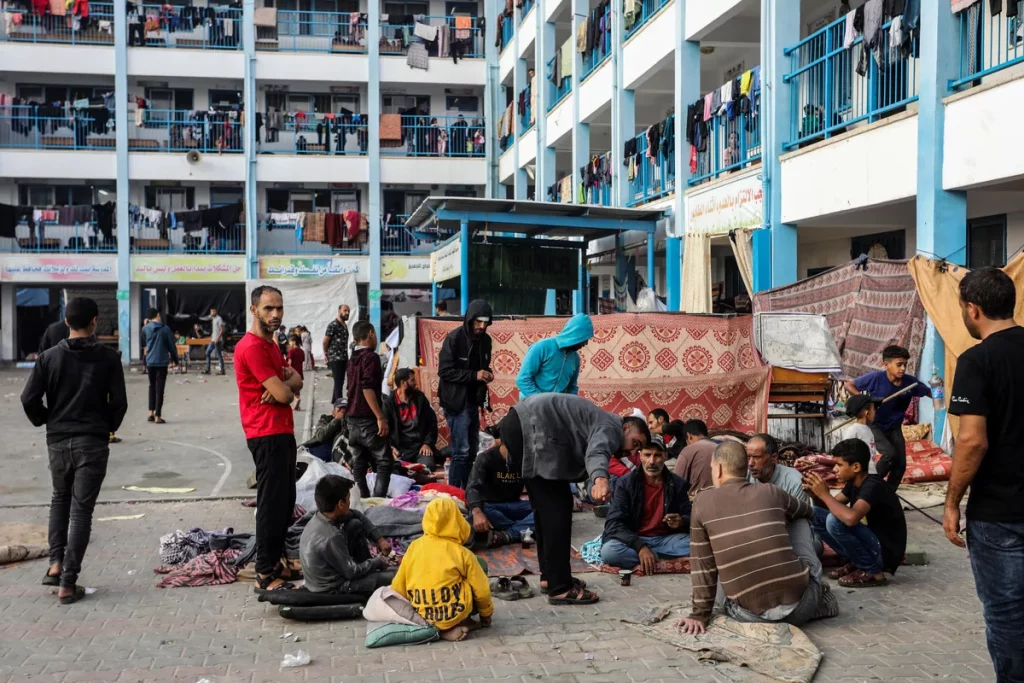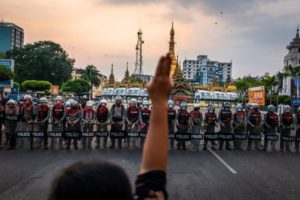The current carnage in Gaza, triggered by the 7 October 2023 Hamas massacre of Israeli citizens and the subsequent military assault on the territory by the Israeli Defence Force (IDF), has killed more than 30,000 Palestinians and is threatening the lives of some two million more. In this article, UAI volunteer and former UNHCR staff member Dr. Jeff Crisp provides a personal commentary on the failure of states and the UN system to provide a safe refuge for those who wish to escape from this deadly scenario.

A non-negotiable right
On 28 March 2024, UNHCR posted a banner on social media, declaring that “No matter where you come from, the right to seek asylum is universal.” “Seeking safety,” it went on to say, is a “non-negotiable human right.”
I found this quite intriguing, as during the preceding six months, UNHCR had said nothing at all about the right of Palestinians to leave Gaza and find refuge elsewhere, despite the massive loss of life and extensive displacement that had taken place as a result of the IDF’s military operation throughout the territory.
In an attempt to understand this apparent contradiction, I contacted UNHCR, and asked for a clarification of the organization’s position on this matter. A few days later, I received the following reply from a spokesperson:
“As you know, there is indeed a universal right to seek asylum. And as you also know, it is UNRWA that is the lead for Palestine refugees in its areas of operation, not UNHCR.”
“With regard to Gaza, the priority must be on an immediate ceasefire, humanitarian access to enable the scaling up of support inside Gaza, and the release of hostages. Equally important is (as naive as it may sound to some and as difficult as it is while in the depths of this crisis) to find a way to address the root causes, make peace, and address the final status issues. Adding another complex layer of crisis and exodus will make the original solution to these problems even more intractable.”
“I would add that while there is indeed a right to seek asylum, there is also an international legal obligation not to deport or forcibly transfer the civilian population of an occupied territory. The points we have all in the UN been making for months – ceasefire, access, aid – are core to this and Israel, especially as an occupying power, must also – like all parties to conflict – abide by its obligations.”
UNHCR deserves some credit for responding so fully to my inquiry, and for raising some very salient issues in relation to the Gaza crisis. There is an evident and urgent need for Israel to respect its duties under international humanitarian law, for its hostages to be released, for the military activities of both parties to the conflict to come to an immediate end, and for civilians in Gaza to be provided with the aid that they so desperately need. Needless to say, continued efforts are also required to resolve the Palestinian refugee situation as a whole, in a manner consistent with successive UN Security Council and General Assembly resolutions.
Examining UNHCR’s response
At the same time, there are a number of comments to be made about the statement provided by UNHCR.
First, UNHCR cannot recuse itself from the plight of Palestinians in Gaza by asserting that they are the responsibility of UNRWA. Egypt, the only country to which they could realistically flee in the first instance, does not lie within UNRWA’s area of operation and is a signatory to the 1951 UN Refugee Convention. Given UNHCR’s supervisory role in relation to that instrument, the organization has an entirely legitimate interest in Egypt’s decision to close its border with Gaza and thereby obstruct the arrival of any Palestinians who feel obliged to leave the territory.
While it is true to say that Palestinian refugees in Gaza have historically been excluded from UNHCR’s mandate because of the protection and assistance they receive from UNRWA, the latter organization is currently unable to discharge those responsibilities.
The IDF’s intensive military campaign has seriously depleted UNRWA’s presence and operational capacity. Israel has placed severe restrictions on the amount and types of aid that the organization can distribute, while UNRWA’s funding has been suspended by a number of key donor states, on the basis of Israeli allegations that some of the organization’s staff members were involved in the Hamas attack of October 2023.
Even if UNHCR believes that the Palestinians in Gaza remain the responsibility of a barely functional UNRWA, some explanation is needed as to why other senior members of the UN system have failed to speak out about the universal and non-negotiable right that people have to seek asylum when their lives and liberty are at risk This silence is particularly disappointing given that the UN Secretary-General, previously served as the UN High Commissioner for Refugees’, while the High Commissioner for Human Rights spent almost the whole of his earlier career with UNHCR, with particular responsibility for protection policy
In fact, the only statement that appears to have been made on the matter of asylum by a high-level UN official has come from the head of OCHA, the body responsible for humanitarian coordination. In a somewhat vague statement made in early April 2024, Martin Griffiths observed “It is clear there is no protection of civilians in Gaza. And if they have no protection from the dangers of armed conflict there, they must be allowed to seek it elsewhere.” But nothing has yet been done to put this principle into practice.
As a result, those Palestinians who do wish to leave Gaza have no alternative but to beg and borrow the thousands of dollars needed to pay the shadowy Egyptian middlemen who are able to arrange departures through the border crossing at Rafah. Escaping from Gaza is thus strictly dependent on access to cash.
Second, UNHCR and the UN system as a whole have adopted a very limited approach to the protection of Palestinians in Gaza, placing all of their faith in the negotiation of a ceasefire, the release of hostages and the expanded delivery of humanitarian relief. This is a striking contrast to other contemporary conflicts – Sudan and Ukraine, for example – where the international response has been based on the assumption that people who are at great danger can be protected by enabling them to leave the theatre of war and find safety in other countries.
With respect to Gaza, the option of flight has simply been ignored, leaving the Palestinians trapped in Gaza, subjected to constant air-raids and repeatedly pushed from one place to another by the Israeli army.
As far as we can tell, the UN has not called upon Egypt – or indeed, Israel, the only other neighbouring country – to open their borders and to respect the principle of non-refoulement, as they are both obliged to do under international refugee and human rights law. Israel, moreover, will not allow Palestinians in Gaza to enter and cross its territory and so that they can make their way to the relative but increasingly tenuous security to be found in the Occupied West Bank.
The UN has not suggested that other states, both within and outside the region, should ease the burden of a refugee influx on Egypt by offering resettlement places or temporary forms of protection to people who want to leave Gaza. And it has not even requested member states to evacuate and care for the most vulnerable Palestinians, such as children who are in need of specialized medical treatment.
Refuge and return
At this point. It should be acknowledged that some Palestinian commentators have suggested that the issue of asylum does not arise in relation to Gaza because the people living there have no intention of leaving the territory. Rather than fleeing, it is argued, they are determined to remain and participate in the establishment of an independent Palestinian state.
UNHCR has not overtly espoused this argument, which is belied by the fact that some Gaza residents are paying large amounts of money to leave, and which effectively denies them the right to exercise freedom of choice. Even so, there is an indication of such thinking in the statement provided by UNHCR, which prioritizes ‘final status issues’ over the question of asylum, and which asserts that an exodus from Gaza will make the resolution of the Palestinian refugee situation as a whole “even more intractable.”
In other words, the people of Gaza should not seek protection elsewhere, because to do so would complicate and compromise the UN-endorsed principle that Palestinian refugees have a right to return to and establish their own state. And that is an awkward position to take for an organization that simultaneously affirms that people have a universal and non-negotiable right to seek asylum.
A final point to be made about the UNHCR statement concerns its suggestion that if the Palestinians currently trapped in Gaza were to leave the territory and seek asylum elsewhere, this would facilitate any intention that Israel might have to deport, forcibly transfer or ‘ethnically cleanse’ those people. As many commentators have pointed out, if that were to happen, Israel would almost certainly not allow them to come back, and would be likely to repopulate Gaza with militant Jewish settlers, as is happening in the West Bank.
While these are entirely legitimate concerns, should they stand in the way of enabling Palestinians in Gaza to seek asylum elsewhere if that is their preferred option? In this respect, the issues of consistency and precedent come into play.
Has UNHCR or any other part of the UN ever suggested that the stateless Rohingya population of Myanmar should be confined to that country and prevented from seeking asylum in Bangladesh, because allowing them to leave would facilitate the very evident ethnic cleansing objectives of the armed forces in their homeland? And if asylum can be effectively denied to people on the grounds that it would facilitate mass expulsions from their country of origin, how many other states, when confronted with an impending refugee influx, would use this argument as a pretext for the closure of their borders?
The politics of protection
On the basis of the evidence presented above, it is difficult to avoid the conclusion that UNHCR and the rest of the UN system have shied away from saying or doing anything that might support the ability of Palestinians to escape from the deadly forms of persecution to which they are being subjected in Gaza. And given the limited scope of the UNHCR statement quoted earlier in this article, one can only speculate why this is.
From what we can gather, UNHCR is reluctant to alienate Egypt, a country with which it has always had a difficult relationship, which has rejected outright the notion of providing asylum to Palestinians from Gaza, and which is simultaneously struggling to cope with a massive influx of Sudanese refugees at its southern border.
At the same time, it seems highly unlikely that UNHCR’s major donors – the USA and the countries of western Europe – would be willing to witness, let alone support, an exodus of refugees from Gaza. This would almost certainly necessitate an enormous (and enormously expensive) relief operation in Egypt, in the unlikely event that Cairo would assent to such an operation on its territory.
UNHCR’s principal donors must also be concerned that if Palestinians were allowed to leave Gaza and enter Egypt, some would endeavour to make their way to Europe via the Mediterranean. Others would place new and unwelcome demands on the limited refugee resettlement programmes administered by the world’s more prosperous states. At a time when immigration and asylum have become two of the most toxic political issues in the Global North, it is not difficult to understand why the states of that region might balk at the prospect of allowing Palestinians to escape from their current confinement in Gaza.
As for other countries in the Middle East, the admission of Palestinians from Gaza, even on an ostensibly temporary basis, seems unlikely to take place, with the possible exception of some small-scale medical evacuations, such as that undertaken recently by Qatar and the United Arab Emirates.
The longstanding Palestinian refugee populations in the region have proven to be politically problematic for the states that host them. Many countries in the Middle East have in recent years had to cope with major influxes of refugees from other war-torn states, most notably Iraq and Syria. And those states will not abandon their long-held position that Palestinians have a right to return to their historic homeland, and should therefore not be dispersed around the world.
Conclusion
For all of the reasons adduced in this article, we should probably not expect the UN Secretary-General, the High Commissioner for Refugees or the High Commissioner for Human Rights to take any kind of lead in asserting that Palestinians should be able to escape from the carnage in Gaza and find safety elsewhere. While perhaps understandable in political and diplomatic terms, this is a grave mistake.
Such inaction seems to suggest that the UN is not really serious about (and is prepared to compromise on) the supposedly universal and non-negotiable right to seek asylum. It sets a terrible precedent for countries that are only too eager to close their borders to refugees who are perceived as a threat to national interests. And it subjugates the principles of asylum and refugee protection to the geopolitical interests of states. However difficult it is for those principles to be put into practice in the context of Gaza, the UN should not abandon them.
Further reading The legal dimensions of this issue are examined by James Hathaway in this article, https://verfassungsblog.de/trapped-in-gaza/ and by Jane McAdam and Guy Goodwin-Gill in this publication: https://lieber.westpoint.edu/refugee-law/. A vivid account of the efforts that Palestinians are making to escape from Gaza can be found here: https://theintercept.com/2024/03/07/gaza-palestinians-border-crossing-egypt/
About the author:
Dr. Jeff Crisp was previously Head of Evaluation and Policy Development at UNHCR and now volunteers for United Against Inhumanity.
The content is the author’s responsibility alone and does not necessarily reflect the views of United Against Inhumanity or any of its other members.












